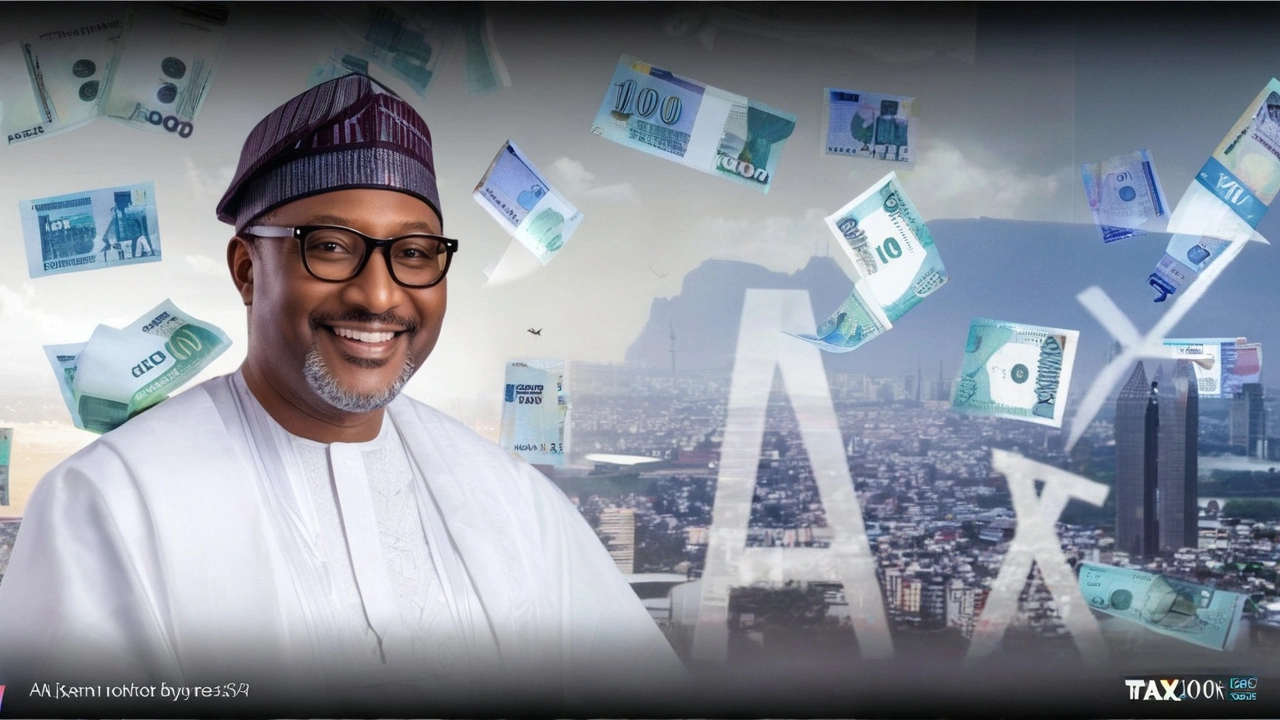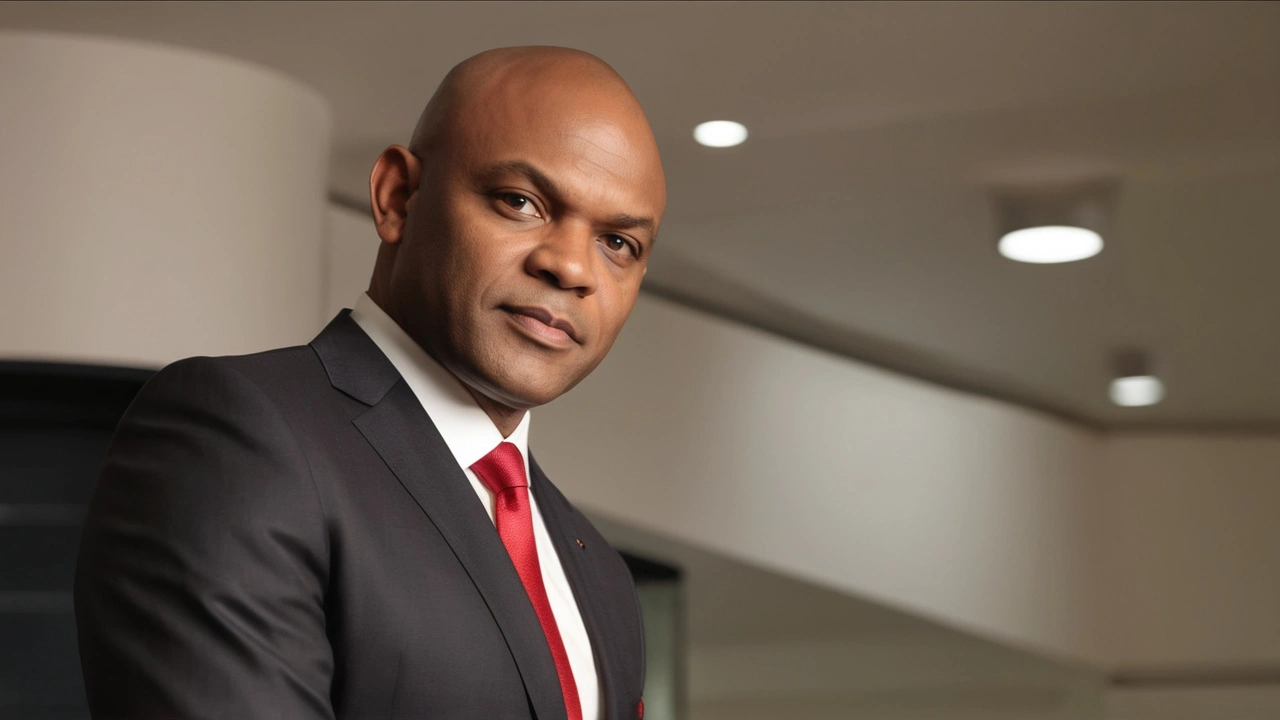Tony Elumelu Endorses Windfall Tax to Combat Poverty
Tony Elumelu, the influential chairman of the United Bank of Africa (UBA), has thrown his considerable weight behind the Nigerian federal government's proposal to impose a windfall tax on the foreign exchange (FX) gains of banks. This proposal arises in response to the substantial profits banks have made due to fluctuations in the FX market. Elumelu's endorsement of this tax came during a pivotal meeting held at the State House in Abuja, where representatives of Nigeria's banking sector, including Elumelu, convened with President Bola Tinubu. The gathering aimed at seeking clarifications on the controversial windfall tax.
The idea of a windfall tax has been a topic of robust debate since President Tinubu urged the National Assembly to amend the 2023 Finance Act, proposing a one-time levy on the extraordinary FX gains banks have accrued. This recommendation highlighted a broader vision of harnessing supernormal profits to bolster the nation’s public sector, addressing critical areas such as infrastructure, education, healthcare, and various welfare initiatives.
While President Tinubu’s initial proposal sought a 50% windfall tax, the National Assembly's amendments in the 2024 Finance Act saw an increase to a staggering 70%. This significant escalation has stirred concern and unease among financial industry stakeholders, prompting fears of potential repercussions for the banking sector's stability and profitability. Despite these anxieties, Elumelu remains steadfast in his belief that the windfall tax can be a powerful tool for redistributing economic wealth and alleviating poverty in Nigeria.
Redistributing Wealth for Public Good
Elumelu’s argument primarily revolves around the principle of mutual prosperity. He asserts that when businesses thrive, they not only create jobs but also stimulate broader economic activities benefiting both local communities and foreign investors. This prosperity is envisioned to trickle down to every segment of society, fostering a happier and more stable community. The chairman's advocacy is deeply rooted in the belief that extraordinary income, especially from sectors like banking that have immensely benefited from the FX market, should be redirected to foster public good.
In his address, Elumelu emphasized the importance of ensuring that no segment of society suffers disproportionately. He contended that the windfall tax represents a fair and strategic approach to wealth distribution, which can lead to sustainable development and long-term societal benefits. Elumelu’s remarks suggest a holistic understanding of economic interdependence, where the prosperity of businesses and the wellbeing of the populace are intricately linked.
A Broader Vision Shared by Industry Leaders
Joining Elumelu in support of the windfall tax is Femi Otedola, the chairman of First Bank of Nigeria (FBN) Holdings. Otedola’s endorsement further underscores a growing consensus among prominent industry leaders that the windfall tax is a pragmatic approach to wealth redistribution. He argued that such a tax measure ensures a fairer economic landscape where the benefits of extraordinary gains are shared more equitably. Otedola's backing signifies a noteworthy alignment among top banking figures with the federal government's fiscal policy goals.
The unified front presented by these industry titans signals a critical shift towards cooperative engagement with governmental policies aimed at social equity. Otedola’s remarks echoed Elumelu’s sentiments, emphasizing the role of the windfall tax in promoting broader economic fairness and enhancing public service provision.
Confronting Industry Concerns
Despite the strong endorsements from Elumelu and Otedola, the proposal to implement a 70% windfall tax has not been without its critics within the financial sector. Concerns have been raised regarding the potential negative impacts on banks’ operational capabilities and their ability to attract investment. Detractors argue that such a high tax rate might deter foreign investments and strain the financial health of banks, ultimately affecting their capacity to contribute to economic growth.
However, proponents like Elumelu remain optimistic, positing that this tax will not cripple the banking industry but rather instigate a balanced redistribution of wealth that benefits the greater society. This perspective sees the potential for banks to remain profitable while also contributing significantly to national development.
The ongoing dialogue between the federal government and the banking industry reflects a broader discourse on how best to harness private sector gains for public good. The discussion encapsulates the tension between maintaining a favorable business environment and addressing pressing social needs through fiscal interventions.
The Path Ahead
As Nigeria navigates the complex dynamics of implementing the windfall tax, Elumelu's support signals a critical endorsement that could sway public opinion and policy decisions. His advocacy highlights the potential for strategic fiscal measures to play a transformative role in national development. The ongoing engagement between government officials and banking leaders will be crucial in shaping a policy that balances economic vibrancy with social equity.
Elumelu's vision for a nation where businesses thrive alongside improved public services resonates with a broader aspiration for inclusive growth. His stance underscores the need for thoughtful policy interventions that harness private sector successes for the collective well-being of all Nigerians. With leaders like Elumelu and Otedola championing the windfall tax, there is hope for a more equitable economic future where prosperity is shared more broadly and no one is left behind.
The unfolding developments and the outcomes of these policy discussions will be closely watched by both domestic and international observers. The precedent set by Nigeria’s handling of the windfall tax could influence similar strategies in other nations facing comparable challenges of wealth inequality and the need for comprehensive public service enhancements.

Conclusion
The support of influential banking figures like Tony Elumelu and Femi Otedola for the federal government’s windfall tax on banks' FX gains can be seen as a strategic move towards achieving broader economic equity in Nigeria. Elumelu’s advocacy points to a future where prosperity is not confined to the private sector but extends to every layer of society through well-directed public services and initiatives. As Nigeria continues to grapple with economic inequalities, such fiscal measures could pave the way for a more inclusive and prosperous nation.
While the debate around the windfall tax persists, the dialogues and decisions made in the coming months will be vital in determining the balance between sustaining economic growth and ensuring the welfare of all Nigerians. The endorsement of the windfall tax by prominent industry leaders highlights a significant step towards reconciling the interests of the private sector with the imperative of social equity.






15 Comments
musa dogan
August 2, 2024 AT 02:31 AMOh, please. Another billionaire in a bespoke suit telling the poor they should be grateful for crumbs from the table. Elumelu’s been sipping champagne on the backs of Naira devaluation for decades. Now he wants to play Robin Hood? With *our* money? The man owns more yachts than there are functional hospitals in Lagos. This isn’t redistribution-it’s performative virtue signaling with a 70% tax sticker on it.
Mark Dodak
August 2, 2024 AT 23:13 PMI think there’s a real opportunity here to reframe this conversation. The FX gains banks made weren’t just luck-they were the result of macroeconomic instability that the government itself helped create through policy missteps. So if you’re going to tax windfalls, why not also tax the volatility that made them possible? A 70% levy might be harsh, but if the revenue is transparently channeled into infrastructure and social safety nets, it could actually stabilize the economy long-term. The key is accountability, not just taxation.
Stephanie Reed
August 3, 2024 AT 00:26 AMI appreciate that leaders are finally talking about wealth redistribution in a meaningful way. It’s easy to criticize taxes, but harder to imagine a system where profits from market manipulation actually help the people who suffer most from those same manipulations. If this funding goes to rural clinics and public schools, it’s not a burden-it’s a bridge.
Jason Lo
August 4, 2024 AT 07:29 AMLet’s be real. This is socialism with a Nigerian accent. You think banks are just sitting on cash like it’s a free lunch? They’re managing risk, liquidity, and capital flows in a country where the central bank can’t even keep inflation under 20%. Tax them 70%? You’ll kill credit, freeze investment, and turn Nigeria into a financial ghost town. And don’t tell me ‘the rich will pay’-they’ll just move their money to Dubai. You’re not helping the poor-you’re punishing the only people who can lift them.
Brian Gallagher
August 5, 2024 AT 08:49 AMFrom a macroprudential standpoint, the proposed windfall tax represents a structural adjustment mechanism aimed at recalibrating rent-seeking behavior within the financial intermediation sector. The FX volatility, while externally driven, has been internally amplified by regulatory arbitrage and currency mismatch exposure. A one-time levy, if fungible and earmarked for sovereign wealth fund capitalization, could mitigate systemic risk while fostering fiscal sustainability. The critical variable is governance architecture-not the tax rate.
Elizabeth Alfonso Prieto
August 5, 2024 AT 19:51 PMI can't believe people are actually defending this. Banks are LOOTING the country and now they want to pretend they're saints? I read somewhere that one bank CEO bought a private jet with FX profits-while nurses in Kaduna are working without gloves. This tax is a drop in the bucket, and if they whine about it, they deserve to be bankrupt. Stop coddling the rich. We need justice, not jargon.
Harry Adams
August 6, 2024 AT 22:06 PMThe real issue isn’t the tax-it’s the lack of institutional credibility. Why should anyone trust that this revenue won’t vanish into the same black hole that swallowed the $20 billion fuel subsidy? Elumelu’s endorsement means nothing if the EFCC can’t even recover a single billion from corrupt officials. Tax the banks? Fine. But first, tax the ministers. Then maybe we’ll talk.
Kieran Scott
August 8, 2024 AT 08:07 AMLet’s not kid ourselves. This isn’t about poverty alleviation. It’s about the Tinubu administration consolidating power under the guise of fiscal reform. The 70% figure? Arbitrary. Designed to intimidate. Elumelu’s support? A strategic alignment-UBA’s FX exposure is minimal compared to others, so he’s happy to sacrifice competitors. This is a power play disguised as moral economics. The real windfall? The political capital they’ll harvest from this spectacle.
Joshua Gucilatar
August 9, 2024 AT 23:36 PMTechnically, a windfall tax on FX gains is not unprecedented. The UK imposed a similar levy on banks after the 2008 crisis. But here’s the catch: those taxes were temporary, transparent, and tied to specific public outcomes. Nigeria’s track record? Zero transparency. Zero accountability. So unless there’s an independent oversight body with teeth-like a sovereign wealth fund audited by the IMF-this isn’t a tax. It’s a confiscation dressed up in progressive rhetoric. And it’ll backfire.
jesse pinlac
August 10, 2024 AT 23:28 PMThe idea that a 70% tax will somehow ‘help the poor’ is a fantasy peddled by people who’ve never run a business. Banks don’t operate on charity. They operate on margins. Crush those margins, and you crush credit. Crush credit, and you crush SMEs. Crush SMEs, and you crush employment. The poor don’t benefit from abstract tax policies-they benefit from jobs, capital, and stable currency. This isn’t equity. It’s economic suicide with a moral label.
Jess Bryan
August 12, 2024 AT 21:55 PMYou think this is about poverty? Nah. This is the deep state’s plan to nationalize the banking sector under the cover of ‘fairness.’ Next thing you know, the CBN will take over all FX operations. Then the military will ‘stabilize’ the markets. Then the elections get delayed. This tax? It’s step one. The real windfall? Total control. Wake up.
Ronda Onstad
August 14, 2024 AT 20:14 PMI’ve lived through multiple currency crises in Nigeria, and I’ve seen how hard it is for ordinary people to survive when the naira tanks. Banks made billions because they had access to dollars when no one else did. That’s not entrepreneurship-that’s privilege. If a fraction of that money goes to rebuilding roads, paying teachers, or fixing power grids, then yes, this tax is not just fair-it’s overdue. Let’s not let perfect be the enemy of good.
Steven Rodriguez
August 15, 2024 AT 08:53 AMThis is why Nigeria will never progress. You let foreign investors in, then you turn around and steal their profits with a 70% tax? Who’s going to invest here next? China? Russia? They’ll love it-no rules, no accountability. But the West? They’ll flee. And then what? We’ll be begging for aid again while our youth starve. This isn’t justice-it’s economic self-sabotage dressed in African pride.
Zara Lawrence
August 15, 2024 AT 20:21 PMI’m sorry, but I have to ask: who exactly is benefiting from this? Elumelu? Otedola? They’re already billionaires. And the government? They’re the ones who let the FX crisis happen in the first place. So now they want to tax the banks to fix their own mistakes? That’s not justice. That’s a shell game. And I’m not buying it. Not one bit.
Ashley Hasselman
August 17, 2024 AT 20:05 PM70%? Cute. Next they’ll tax oxygen. At least the banks are doing something right in a country where the government can’t even keep the lights on. Let them keep their profits. They’re the only ones keeping the economy from collapsing.